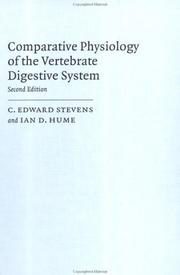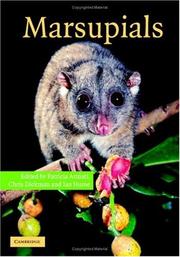| Listing 1 - 6 of 6 |
Sort by
|

ISBN: 0521444187 9780521444187 Year: 1995 Publisher: Cambridge ; New York, NY : Cambridge University Press,
Abstract | Keywords | Export | Availability | Bookmark
 Loading...
Loading...Choose an application
- Reference Manager
- EndNote
- RefWorks (Direct export to RefWorks)
Animal physiology. Animal biophysics --- Vertebrates --- Physiology --- Digestive organs --- Zoology and Animal Sciences. Zoology --- Zoology and Animal Sciences. Biology of Animal Taxonomic Groups --- Digestive organs. --- Physiology. --- Animal Physiology and Biochemistry --- Comparative Physiology --- Vertebrata --- Comparative Physiology. --- Vertebrata. --- Vertebrates - Physiology --- Vertebrates - Digestive organs

ISBN: 0521650747 9780521650748 9781107406070 9780511541889 9780511242076 0511242077 0511240422 9780511240423 0511240945 9780511240942 0511241461 9780511241468 1280567791 9781280567797 1107157773 9781107157774 9786610567799 6610567794 0511318138 9780511318139 0511541880 1107406072 Year: 2006 Publisher: Cambridge : Cambridge University Press,
Abstract | Keywords | Export | Availability | Bookmark
 Loading...
Loading...Choose an application
- Reference Manager
- EndNote
- RefWorks (Direct export to RefWorks)
This 2006 book examines the exciting discoveries in the study of marsupials of the last 20 years. These discoveries have led to significant developments in our understanding of this unique group of mammals. The impact of these developments have been such that marsupials are coming to be seen as model organisms in studies of life history evolution, ageing and senescence, sex determination and the development and regeneration of the nervous system. This volume brings together information scattered throughout the primary literature. Coverage includes evolutionary history and management strategies as well as all aspects of basic biology. A complete listing of known species and a comprehensive list of references make this a unique repository of information on this fascinating group of animals.
Marsupiaux --- Mammifères --- Marsupials. --- 599.2 --- Buideldier --- Marsupialia. Pouched mammals --- 599.2 Marsupialia. Pouched mammals --- Marsupials --- Marsupialia --- Pouched animals --- Mammals --- Marsupiaux. --- Mammifères. --- Mammals. --- Eutheria --- Mammalia --- Mammalians --- Prototheria --- Theria --- Vertebrates
Book
ISBN: 354087884X 3642036953 9786611951016 1281951013 3540878858 Year: 2009 Publisher: Berlin, Heidelberg : Springer Berlin Heidelberg : Imprint: Springer,
Abstract | Keywords | Export | Availability | Bookmark
 Loading...
Loading...Choose an application
- Reference Manager
- EndNote
- RefWorks (Direct export to RefWorks)
Nutrition spans a wide range of mechanisms from acquisition of food to digestion, absorption and retention of energy substrates, water and other nutrients. Nutritional principles have been applied to improving individual health, athletic performance and longevity of humans and of their companion animals, and to maximizing agricultural efficiency by manipulating reproduction or growth of tissues such as muscle, hair or milk in livestock. Comparative nutrition borrows from these traditional approaches by applying similar techniques to studies of ecology and physiology of wildlife. Comparative approaches to nutrition integrate several levels of organization because the acquisition and flow of energy and nutrients connect individuals to populations, populations to communities, and communities to ecosystems. Integrative Wildlife Nutrition connects behavioral, morphological and biochemical traits of animals to the life history of species and thus the dynamics of populations. An integrated approach to nutrition provides a practical framework for understanding the interactions between food resources and wildlife populations and for managing the harvest of abundant species and the conservation of threatened populations. This book is for students and professionals in animal physiology and ecology, conservation biology and wildlife management. It is based on our lectures, demonstrations and practical classes taught in the USA, Canada and Australia over the last three decades. Instructors can use Integrative Wildlife Nutrition as a text in wildlife and conservation biology programs, and as a reference source for related courses in wildlife ecology.
Animal nutrition --Requirements. --- Animal nutrition. --- Animal Nutritional Physiological Phenomena. --- Animals --Food. --- Animals --Metabolism. --- Animals. --- Nutritional Requirements. --- Animal nutrition --- Animals --- Eukaryota --- Nutritional Physiological Phenomena --- Organisms --- Physiological Phenomena --- Phenomena and Processes --- Animal Nutritional Physiological Phenomena --- Nutritional Requirements --- Agriculture --- Zoology --- Earth & Environmental Sciences --- Health & Biological Sciences --- Zoology - General --- Animal Sciences --- Vertebrates --- Metabolism --- Food --- Requirements --- Physiology. --- Animal ecology. --- Conservation biology. --- Environmental management. --- Nutrition. --- Wildlife management. --- Animal populations --- Game management --- Management, Game --- Management, Wildlife --- Plant populations --- Wildlife resources --- Alimentation --- Nutrition --- Environmental stewardship --- Stewardship, Environmental --- Animal physiology --- Management --- Health aspects --- Ecology --- Physiology --- Life sciences. --- Ecology. --- Animal physiology. --- Wildlife. --- Fish. --- Life Sciences. --- Fish & Wildlife Biology & Management. --- Animal Physiology. --- Conservation Biology/Ecology. --- Environmental Management. --- Animal Ecology. --- Health --- Diet --- Dietetics --- Digestion --- Food habits --- Malnutrition --- Environmental sciences --- Nature conservation --- Natural resources --- Wildlife conservation --- Biology --- Anatomy --- Ecology . --- Nutrition . --- Balance of nature --- Bionomics --- Ecological processes --- Ecological science --- Ecological sciences --- Environment --- Environmental biology --- Oecology --- Population biology --- Fish --- Pisces --- Aquatic animals --- Fisheries --- Fishing --- Ichthyology
Digital
ISBN: 9783540878858 Year: 2009 Publisher: Berlin, Heidelberg Springer Berlin Heidelberg
Abstract | Keywords | Export | Availability | Bookmark
 Loading...
Loading...Choose an application
- Reference Manager
- EndNote
- RefWorks (Direct export to RefWorks)
Nature protection --- Animal physiology. Animal biophysics --- Animal ethology and ecology. Sociobiology --- Nutritionary hygiene. Diet --- Environmental protection. Environmental technology --- natuurbeheer --- dierenecologie --- voedingsleer --- fysiologie --- milieubeleid --- natuurbescherming --- zoölogie --- milieubescherming
Book
ISBN: 9783642036958 Year: 2009 Publisher: Heidelberg Springerf
Abstract | Keywords | Export | Availability | Bookmark
 Loading...
Loading...Choose an application
- Reference Manager
- EndNote
- RefWorks (Direct export to RefWorks)
Book
ISBN: 9783540878858 Year: 2009 Publisher: Berlin Heidelberg Springer Berlin Heidelberg
Abstract | Keywords | Export | Availability | Bookmark
 Loading...
Loading...Choose an application
- Reference Manager
- EndNote
- RefWorks (Direct export to RefWorks)
Nutrition spans a wide range of mechanisms from acquisition of food to digestion, absorption and retention of energy substrates, water and other nutrients. Nutritional principles have been applied to improving individual health, athletic performance and longevity of humans and of their companion animals, and to maximizing agricultural efficiency by manipulating reproduction or growth of tissues such as muscle, hair or milk in livestock. Comparative nutrition borrows from these tra- tional approaches by applying similar techniques to studies of ecology and physiology of wildlife. Comparative approaches to nutrition integrate several levels of organization because the acquisition and flow of energy and nutrients connect individuals to populations, populations to communities, and communities to ecosystems. Integrative Wildlife Nutrition connects behavioral, morphological and biochemical traits of animals to the life history of species and thus the dynamics of populations. An integrated approach to nutrition provides a practical framework for understanding the interactions between food resources and wildlife popu- tions and for managing the harvest of abundant species and the conservation of threatened populations. This book is for students and professionals in animal physiology and ecology, conservation biology and wildlife management. It is based on our lectures, dem- strations and practical classes taught in the USA, Canada and Australia over the last three decades. Instructors can use Integrative Wildlife Nutrition as a text in wildlife and conservation biology programs, and as a reference source for related courses in wildlife ecology.
Nature protection --- Animal physiology. Animal biophysics --- Animal ethology and ecology. Sociobiology --- Nutritionary hygiene. Diet --- Environmental protection. Environmental technology --- natuurbeheer --- dierenecologie --- voedingsleer --- fysiologie --- milieubeleid --- natuurbescherming --- zoölogie --- milieubescherming
| Listing 1 - 6 of 6 |
Sort by
|

 Search
Search Feedback
Feedback About
About Help
Help News
News